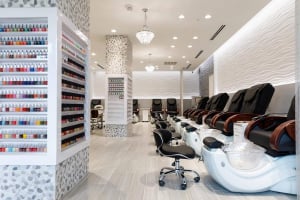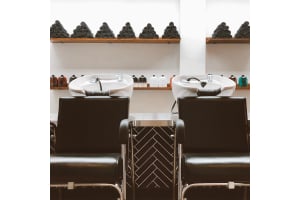Navigating the License Labyrinth: A Guide to Salon Suite Permits

Renting a salon suite and owning your own business can be an exciting venture for beauty
professionals seeking independence and control over their workspace. However, before you
dive headfirst into the world of salon suite rental, it's crucial to understand the licenses
required to operate legally. Navigating the license labyrinth may seem overwhelming, but
with the right knowledge, you can set yourself up for success. In this guide, we'll break down
the essential licenses needed to rent a salon suite while owning your own business, ensuring
you're on the right side of the law.
Cosmetology License
The cornerstone of any beauty professional's career is the cosmetology license. Whether
you're a hairstylist, nail technician, esthetician, or any other beauty service provider, you
must possess a valid cosmetology license. This license attests to your proficiency in the
specific beauty services you offer, ensuring the safety and satisfaction of your clients. Before
considering starting your own business in a salon suite, verify that your cosmetology license
is up to date and valid in the state where you plan to operate.
Business License
Once you've secured your cosmetology license, the next step is obtaining a business license.
This license is essential for any individual or business operating within a specific jurisdiction.
It legitimizes your business, ensures compliance with local regulations, and often requires
you to pay local taxes. Contact your local city or county government office to inquire about
the specific requirements and procedures for obtaining a business license in your area.
Without a valid business license, you may face penalties, fines, or even legal action.
Salon Suite Rental Agreement
While not a traditional license, having a solid salon suite rental agreement is crucial for your
business. This document outlines the terms and conditions of your rental arrangement with
the salon suite property owner. It typically includes details such as rent payments, lease
duration, responsibilities of both parties, and any restrictions on the use of the space. Ensure
that you thoroughly review and understand the terms of the agreement before signing. Seek
legal advice if necessary to avoid any potential pitfalls and to protect your interests as a
salon suite renter.
Health Department Permits
Depending on the nature of your beauty services, you may need additional permits from the
health department. For example, if you offer services like tattooing, body piercing, or even
some types of skincare procedures, health department permits may be required to ensure
that your practices meet health and safety standards. Contact your local health department
to inquire about the specific permits relevant to your services and the associated application
processes.
Sales Tax Permit
If your salon suite business involves selling beauty products directly to clients, you may need
a sales tax permit. This permit allows you to collect and remit sales tax on the products you
sell, ensuring compliance with state and local tax regulations. Research the sales tax
requirements in your area and obtain the necessary permits to avoid legal complications and
financial penalties.
Insurance Coverage
While not a needed license, having the right insurance coverage is critical for protecting your
salon suite business. Consider obtaining liability insurance to safeguard against potential
accidents, property damage, or professional liability claims. Additionally, check if your salon
suite rental agreement requires you to carry specific insurance coverage. Adequate insurance
can provide peace of mind and financial protection in the event of unforeseen circumstances.
Renting a salon suite and owning your own business can be an exciting venture for beauty professionals seeking independence and control over their workspace. Start by ensuring your cosmetology license is current, obtain the necessary business and health department permits, and carefully review your salon suite rental agreement. Additionally, don't overlook the importance of insurance coverage to protect your business. These steps will help you establish a solid foundation for a successful and legally compliant salon suite venture.







